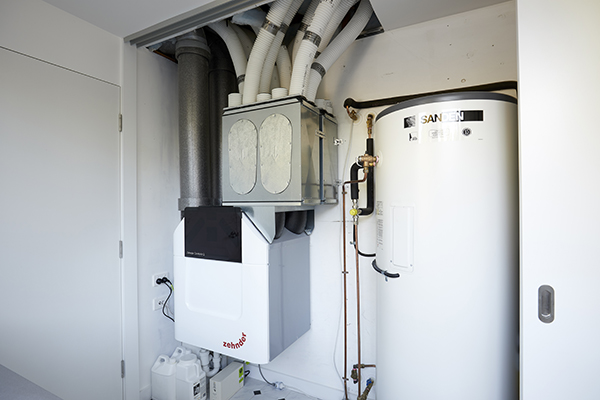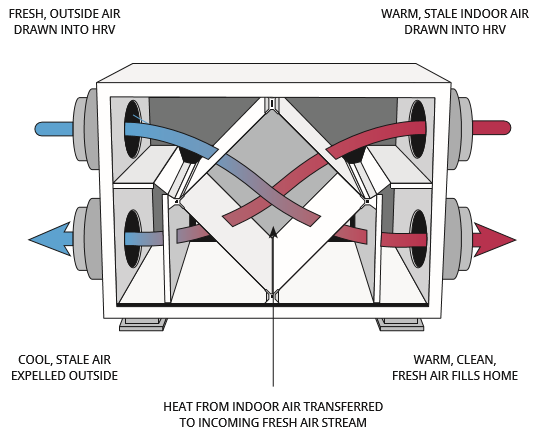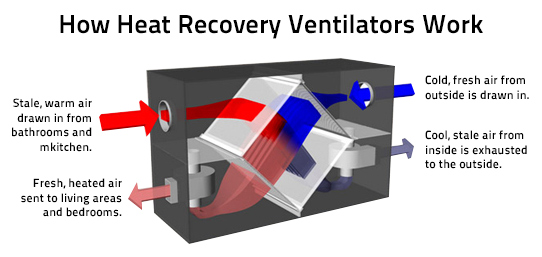How Does HRV and Why It Matters for Energy Savings
Wiki Article
Checking out the Perks of Heat Recovery Ventilation for Energy Performance in Houses
Heat Recovery Ventilation (HRV) systems use home owners a functional method to enhancing power effectiveness. By recovering warmth from outward bound air, these systems can substantially minimize heating and cooling expenses. Furthermore, they supply a constant supply of fresh air, improving interior air top quality and convenience levels. As home owners take into consideration lasting alternatives, understanding the subtleties of HRV systems comes to be significantly vital. What elements should one examine prior to making such an investment?Comprehending Heat Recovery Ventilation Solutions

Exactly How HRV Boosts Indoor Air Quality

Power Cost Savings: The Financial Benefits of HRV
Optimizing energy performance, heat recovery ventilation (HRV) systems offer significant financial benefits for property owners. By recovering and recycling warmth from exhaust air, HRVs noticeably decrease heating & cooling costs. This modern technology can cause click this site energy financial savings of as much as 30%, relying on climate and usage patterns. Home owners frequently discover decreased energy costs quickly after setup, making HRVs a financially smart investment in time. In addition, several regions give rewards or discounts for energy-efficient upgrades, better enhancing the financial appeal. As energy rates remain to rise, the cost-effectiveness of HRVs comes to be progressively clear. Generally, the consolidation of HRV systems not only advertises power effectiveness yet likewise contributes to long-lasting economic cost savings for households.The Ecological Influence of Heat Recovery Ventilation
A considerable ecological advantage of heat recovery ventilation (HRV) systems exists in their ability to lower overall energy usage. By recovering heat from exhaust air and transferring it to incoming fresh air, HRV systems lessen the requirement for energy-intensive home heating and cooling down techniques. This reduction in energy need contributes to decrease greenhouse gas discharges, as much less nonrenewable fuel source is called for to keep comfortable indoor temperatures. Furthermore, HRV systems enhance interior air high quality by efficiently trading stagnant air with fresh exterior air, lowering dependence on mechanical air conditioning systems that can harm the atmosphere. Generally, the application of HRV systems sustains lasting living practices and straightens with global initiatives to battle environment modification by promoting energy performance in property settings.
Picking the Right HRV System for Your Home
Exactly how can house owners guarantee they select the best heat recovery ventilation (HRV) system for their demands? They ought to evaluate their home's dimension and layout, as these aspects affect air movement requirements. Next, reviewing the system's efficiency scores is essential, as greater ratings show better performance and energy cost savings. House owners should additionally consider installation and upkeep expenses, comparing various brands and models for value. Additionally, it is necessary to examine sound degrees, as some systems run more quietly than others. Consulting with cooling and heating professionals can provide customized referrals based upon specific home conditions. Finally, taking a look at user testimonials and service warranties can aid in making a notified choice, guaranteeing that the selected HRV system successfully improves interior air quality and power efficiency.Frequently Asked Concerns

Exactly how Usually Should I Clean or Maintain My HRV System?
The frequency of cleaning or keeping a heat recovery ventilation (HRV) system generally depends on use Visit Your URL and ecological variables. Normally, it is recommended to carry out maintenance every original site 6 months to ensure peak performance and air top quality.
Can HRV Systems Help In Reducing Humidity Levels Inside?
HRV systems can effectively lower interior humidity degrees by trading stagnant, humid air with fresh, drier air from outside. HRV Heat Recovery Ventilation. This process assists preserve a well balanced indoor atmosphere, enhancing convenience and stopping moisture-related concerns
What Is the Life-span of a Regular HRV System?
The life expectancy of a regular heat recovery ventilation (HRV) system differs, generally lasting between 10 to 15 years. Regular maintenance can extend its efficiency and operational life, guaranteeing peak efficiency throughout its use duration.Exist Any Type Of Noise Interest In HRV Equipments?
Sound concerns with HRV systems can occur, especially from follower operation. Several contemporary systems are developed to reduce audio levels, guaranteeing they operate quietly while keeping efficiency, which addresses prospective disturbances in living settings.Can I Mount an HRV System Myself, or Do I Need a Professional?
The individual contemplated whether to install the heat recovery ventilation (HRV) system directly or work with a professional. Generally, while DIY setup is feasible, competence guarantees appropriate capability and conformity with neighborhood building codes, boosting system efficiency.Report this wiki page